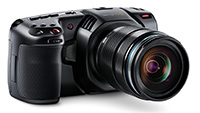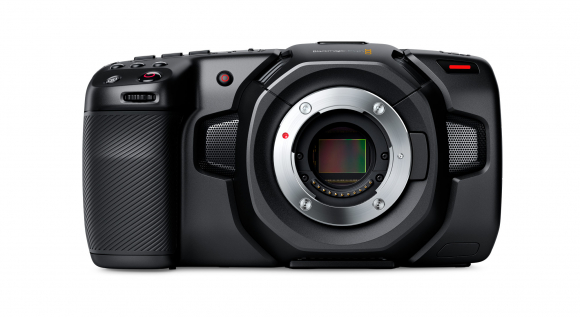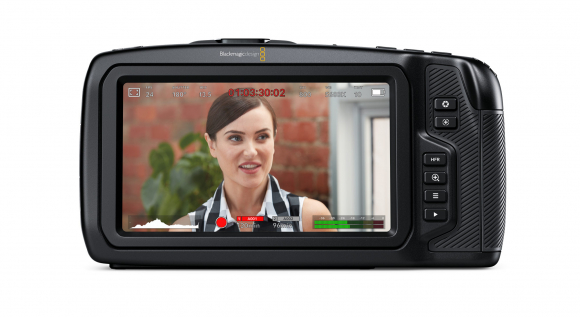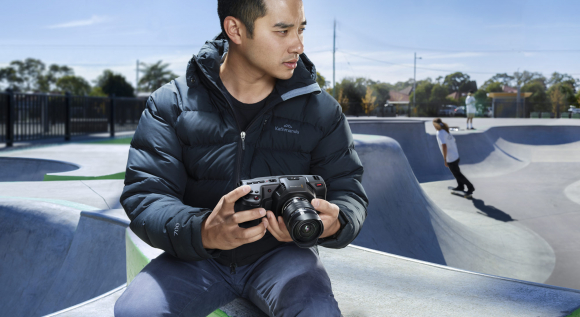Blackmagic’s new 4K Pocket Cinema Camera looks good on paper, but I’m unconvinced
posted Monday, April 9, 2018 at 4:00 PM EST

Blackmagic today announced a new Pocket Cinema camera, which isn't so much a "pocket" camera anymore but it does add some impressive specs with an even more impressive price. The new camera is a handheld digital film camera with full 4/3 HDR sensor, dual native ISO with up to 25600 ISO as well as 13 stops of dynamic range. It also eliminates external recorders, as it features a unique new USB-C Expansion Port, which allows users to record using the internal SD/UHS-II and CFast recorders or directly to the same external disks they will use for editing and color correction. The Blackmagic Pocket Cinema Camera 4K will be available from Blackmagic Design resellers worldwide later this year for only US$1,295. That's an incredible deal for what looks like, on paper, to be an excellent small camera that competes directly with the Panasonic GH5.
As seen in a nice in-depth preview on Cinema5D, Blackmagic is saying that “If URSA is the camera you go and shoot other people with, this is the camera you shoot yourself with.” And that is a nice way to market the camera, considering its size and price point, knowing the kinds of audiences and customers both those features attract.
The new Pocket Cinema Camera 4K offers 13-stops of dynamic range and records full cinema 4K (4096 x 2160 pixels) at up-to 60fps with a newly designed M4/3 (21.60 x 17.30mm) sensor as well as Full HD 120 fps at a yet unspecified crop factor. In 4K though, you will be able to record in CinemaDNG RAW and 10-bit Apple ProRes 422 (HQ).

Fourth generation "Blackmagic Design color science" allows you to shoot HDR images in film, video and new extended video modes. The new extended mode combines the latitude of digital film with an optimized video file.
Images can be recorded onto standard SD cards, faster UHS-II cards or CFast 2.0 cards in either ProRes or RAW formats (which can swap while recording if the second slot is fast enough for the files you're attempting to write). It’s also the first camera that lets you record directly onto the same exact external USB-C media drives you would use for editing and color correction. That means you can turn projects around much more quickly because you wouldn't have to spend time transferring files around among devices and cards.

The rear of the camera sports a 5-inch LCD touchscreen that, if you look at images over at Cinema5D, takes up most of the back of the camera. Hopefully it is bright enough to compete with direct sunlight.
The new camera will also use Canon LP-E6N batteries to operate rather than the Blackmagic branded lithium ion batteries that you might be used to on the previous iteration of this camera.
Blackmagic Pocket Cinema Camera 4K Features
- Full size 4/3 sized sensor with native 4096 x 2160 resolution sized sensor.
- Compatible with extremely high quality Micro Four Thirds lenses.
- Super wide 13 stops of dynamic range allows capture for high end feature film look.
- Up to 25600 ISO for incredible low light performance.
- Carbon fiber polycarbonate composite body which makes it lightweight, portable and durable.
- Multi function grip for quick access to recording start/stop, still photos, ISO, shutter, aperture, white balance, power and more.
- Built in SD, UHS-II and CFast card recorders.
- USB-C expansion port allows longer duration recording directly to an external SSD or flash disk.
- Standard open file formats compatible with popular NLE software such as 10-bit ProRes and 12 bit RAW.
- Features full size HDMI output for monitoring with camera status graphic overlay.
- Professional mini XLR input with 48 volts of phantom power for connecting to pro microphones.
- 3.5mm audio jack, headphone jack, and locking DC 12 volt power connection.
- Built in 5” LCD touchscreen allows accurate focus when shooting 4K.
- LCD supports on-screen overlays including status, histogram, focus peaking, and transport controls.
- Records 4K images at up to 60 frames per second and windowed HD at up to 120 frames per second.
- 3D LUTs can be applied for both monitoring and recording.
- Same Blackmagic OS as used in URSA Mini and URSA Broadcast cameras.
- 4th generation Blackmagic color science.
- Supports remote camera control via Bluetooth.
- Includes full license for DaVinci Resolve Studio editing, color, visual effects and audio post production.

And all that is extremely cool, as far as feature sets and versatility is concerned. But... I'm personally withholding excitement right now. I have had some bad experiences with Blackmagic cinema cameras in the past, most specifically with the Pocket Cinema Cameras. I've had crippling overheating problems, card writing errors, software glitches that break recording mid shot or straight up fail the camera right before I wanted to record, bad battery performance (like, minutes of recording time before they drained) and more. In the times I've shot with Blackmagic, I've found myself more concerned with the camera than what I was shooting, and that's not an ideal position to be in. I'm really happy to see that Blackmagic is moving away from their own batteries and using a more "industry standard" one in the Canon battery, but it remains to be seen just how efficient it will be with that battery. I need hours of shooting time, not just a few minutes. Additionally, Blackmagic has not been the swiftest when it comes to stocking their product.
Granted, this is all in the past and is only representative of my personal experience. Blackmagic may be different today. But for me, those personal experiences with their product are giving me pause here. It's just hard to be excited anymore, given my troubles with them in the past.
I want this camera to be absolutely killer, because that price point for those features is really impressive. Who wouldn't want the option to shoot in 4Kp60 RAW with a camera that can fit in a backpack? That's a documentarian's dream. Blackmagic has all the makings of producing a camera that can absolutely slay the competition, but it remains to be seen if that will happen.